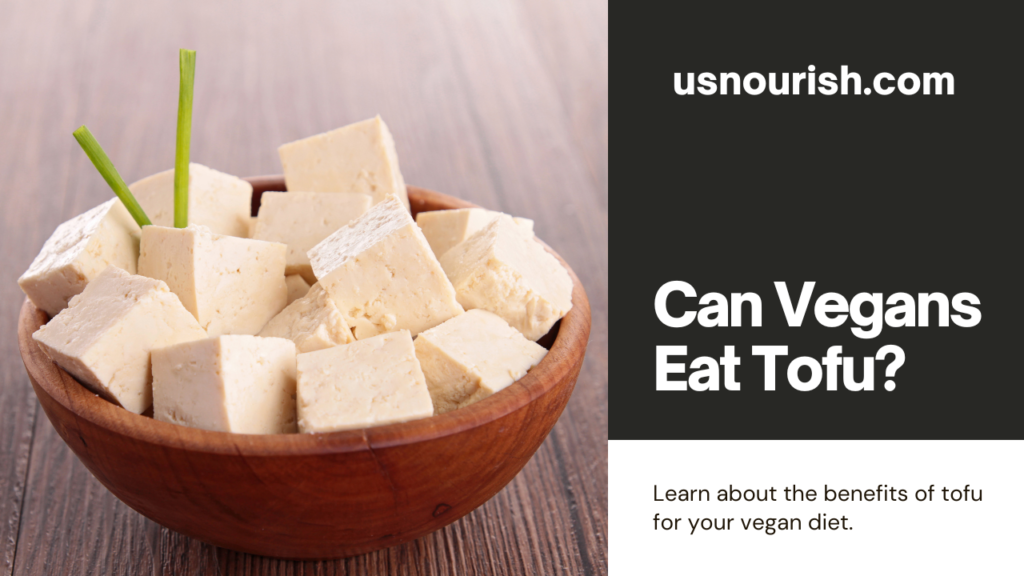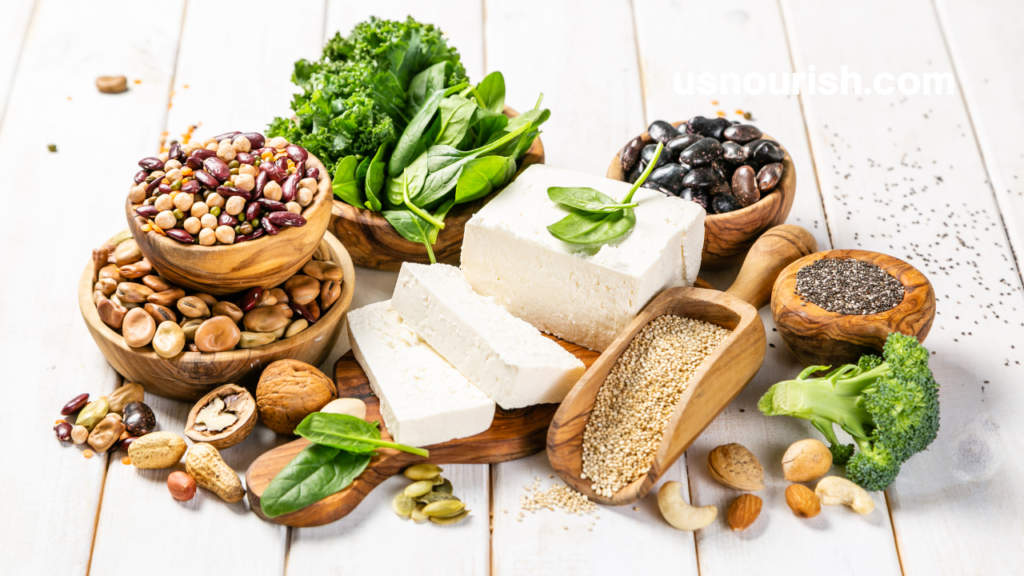People often wonder, “Can vegans eat tofu?” in the midst of all the different food options.
Many people seem to still have this question, maybe because they don’t fully understand this adaptable soy-based food.
Tofu is a special food when it comes to plant-based diets because it has been around for hundreds of years and is used in many different types of food around the world.
Join us as we try to find the answer to this question by looking into whether tofu is vegan-friendly, how healthy it is, and how it can be used as a sustainable food choice.
Tofu is a source of hope for people who are trying to live a vegan lifestyle. Let’s bust some myths and false beliefs about it.
What is tofu?

Tofu, which is also called “bean curd,” is a food that is made by coagulating soy milk and then pressing the curds into solid white blocks.
With its mild taste, it is very flexible and takes on the flavors of other foods in a dish easily.
There are different types of tofu, from extra-firm to soft, and each is good for different cooking uses.
Can Vegans Eat Tofu ? Its’s History in East Asian Cuisine
Tofu has a long history that goes back more than 2,000 years. It was first made in China during the Han era.
Tofu came from China and spread all over East Asia, becoming an important part of many dishes, such as Japanese, Korean, and Vietnamese.
It was useful as a food source because it could be used in many ways and was healthy, especially for Buddhist groups that were looking for plant-based protein sources.
What Is in Tofu?
Tofu is famous for being high in nutrients and easy to incorporate into vegan and vegetarian diets. This protein has all nine important amino acids that humans need to stay healthy.
On top of that, tofu has a lot of iron, calcium, magnesium, phosphorus, and other important nutrients.
Because it is low in calories and fatty fat, it is a great choice for people who want to eat a healthy, balanced diet.
**Tofu and Veganism: How They Work Together**
Correcting the misunderstanding: Is tofu really vegan?
Reason: This part will talk about the false belief that tofu might not be completely vegan because it comes from soy and could be contaminated with animal products during processing.
Clarification: It will make it clear why tofu is actually vegan by pointing out that it comes from plants and doesn’t use any ingredients that come from animals in its traditional production process.
Busting Myths: Common false beliefs about tofu’s vegan status will be talked about and busted with facts, such as worries about additives or cooking methods.
Tofu is a mainstay of vegan diets; here’s why vegans love it.
-Nutritional Value: This section will talk about why tofu has become such an important part of vegan diets, focusing on its high protein content, ability to be cooked in a variety of ways, and ability to make foods taste like they have meat in them.

Culinary Versatility: It will talk about how tofu’s neutral flavor makes it work with many different types of food and cooking ways, which is why vegans love it because it can take on many different flavors.
Accessibility: This part will talk about how tofu is easy for vegans around the world to get because it is cheap and easy to find in major grocery stores.
**Ethical questions: Is making tofu okay for vegans?**
– Sustainable Sourcing: It will look at the moral issues surrounding making tofu, focusing on environmentally friendly soy farming methods and attempts to reduce damage to the environment.
– Labor Practices: The working conditions in the tofu industry will be talked about, including fair labor practices and worker safety issues.
Animal Welfare: This section will look at how the production of tofu compares to the farming of animals in terms of animal welfare, focusing on how cruelty-free tofu is as a plant-based alternative to animal goods.
Tofu Nutrition: Benefits for Vegans
- Protein powerhouse: Tofu’s role as a protein source in vegan diets 💪
- Tofu is renowned for its high protein content, making it an invaluable component of vegan diets where plant-based protein sources are crucial.
- A 100-gram serving of tofu typically contains around 8-10 grams of protein, making it comparable to many animal-based protein sources.
- Tofu provides all nine essential amino acids, making it a complete protein source suitable for meeting the body’s protein needs.
- Rich in essential nutrients: Exploring tofu’s vitamins and minerals 🥦
- Tofu is not just about protein; it’s also a rich source of essential nutrients vital for overall health.
- It contains significant amounts of iron, calcium, manganese, selenium, phosphorus, and magnesium, contributing to bone health, muscle function, and immune support.
- Tofu is often fortified with vitamins like B12 and D, addressing common deficiencies in vegan diets and enhancing its nutritional profile.
- Low in saturated fats: Tofu as a heart-healthy option for vegans ❤️
- Unlike many animal-based protein sources, tofu is low in saturated fats and cholesterol, making it a heart-healthy choice.
- The fats present in tofu are primarily unsaturated fats, including beneficial omega-3 and omega-6 fatty acids, which are essential for brain function and cardiovascular health.
- Incorporating tofu into a vegan diet can help maintain healthy cholesterol levels and reduce the risk of heart disease, making it a valuable addition to heart-conscious meal plans.
Environmental Impact of Tofu Production
1. Sustainable soy farming practices: Evaluating tofu’s environmental footprint
- Explanation: Tofu is primarily made from soybeans, and the methods used to cultivate soybeans can significantly impact the environment.
- This section will delve into sustainable soy farming practices, such as organic farming, crop rotation, and minimal pesticide usage.
- It will discuss how these practices reduce soil erosion, preserve biodiversity, and minimize water pollution compared to conventional soy farming methods.
- Example: Highlighting specific sustainable soy farming initiatives or certifications that prioritize environmental conservation, such as the Rainforest Alliance or the Roundtable on Responsible Soy.
2. Comparing tofu production to animal agriculture: Why tofu is a more eco-friendly option
- Explanation: Tofu production often garners attention for its environmental implications when compared to animal agriculture.
- This subsection will analyze the environmental impact of tofu production versus livestock farming, focusing on factors such as land use, water consumption, greenhouse gas emissions, and deforestation.
- It will emphasize why tofu emerges as a more sustainable and eco-friendly option for meeting dietary protein needs.
- Example: Providing statistics or studies comparing the carbon footprint of tofu production to that of meat and dairy products, showcasing tofu’s lower environmental impact per unit of protein produced.
- Key Points: Highlighting tofu’s potential to mitigate environmental degradation associated with deforestation, habitat loss, and water scarcity compared to animal agriculture.
- Additionally, emphasizing tofu’s role in reducing greenhouse gas emissions and mitigating climate change by promoting more efficient land use and resource allocation.
What you need to know to add tofu to a vegan diet
1. “Cooking with tofu: Tips for Making Delicious Vegan Meals” includes an introduction to pressing, soaking, and cooking tofu.
– Advice on how to get the taste you want, whether it’s chewy, crispy, or smooth.
Seasonings, spices, and ingredients that go well with each other can be used to improve the taste of food.
— Tips on how to use tofu in different types of food, like Asian stir-fries, Mexican tacos, Italian pasta meals, and more.
—How to use tofu instead of meat in classic dishes like burgers, sandwiches, and soups.
2. **Meal plans and recipes with tofu as the main ingredient**
– A collection of different tofu-based recipes, such as tofu scrambles for breakfast, tofu salads for lunch, tofu stir-fries for dinner, and tofu sweets.
Focus on being creative and flexible: tofu-based meals can be as easy and quick as they can be fancy and time-consuming.— Recipes for tofu nuggets, tofu spaghetti, tofu curry, and other foods that are good for the whole family.
– Using seasonal vegetables to make tofu-based meals that are fresh and full of color.
– Serving meal plans with tofu as the main source of protein that are properly balanced.
3. Looking at different kinds of tofu and how to use them in cooking
– A look at the different kinds of tofu, including silken, soft, firm, extra-firm, and spiced tofu.
—A description of the feel of each type of tofu and its best uses in cooking.
– Guidance on choosing the appropriate tofu variety based on the desired recipe.
—A look at smoked tofu, baked tofu, and pickled tofu, which are all unique types of tofu.
This article gives you ideas for trying out different kinds of tofu in both classic and new recipes.
In the end,
**Recap of important points:**
Below, we’ll outline the main points and conclusions of the blog post.
We go over the topics of tofu and veganism again, focusing on how it can be a healthy, protein-rich addition to plant-based meals.
We stress how important tofu is for vegans and how versatile it is in the kitchen by listing its health benefits.
“Encouraging vegans to embrace tofu as a flexible and environmentally friendly food option:”
This article gives vegans words of support to eat more tofu. Our focus is on how tofu can be used in a variety of recipes and meals, from smoothies to stir-fries, showing that it is a flexible ingredient that can suit a wide range of tastes.
By comparing tofu’s sustainability to that of animal-based protein sources, we also encourage vegans to think about how their food choices affect the world.
Final thoughts on busting myths about tofu and veganism
This section talks about the bigger effects of busting myths about tofu and veganism. Removing false information is very important for helping people understand plant-based diets better and making smart food choices.
By addressing common misunderstandings about tofu, we hope to give people the tools they need to make empowered food choices while also supporting the addition of sustainable and healthy foods like tofu in vegan diets.